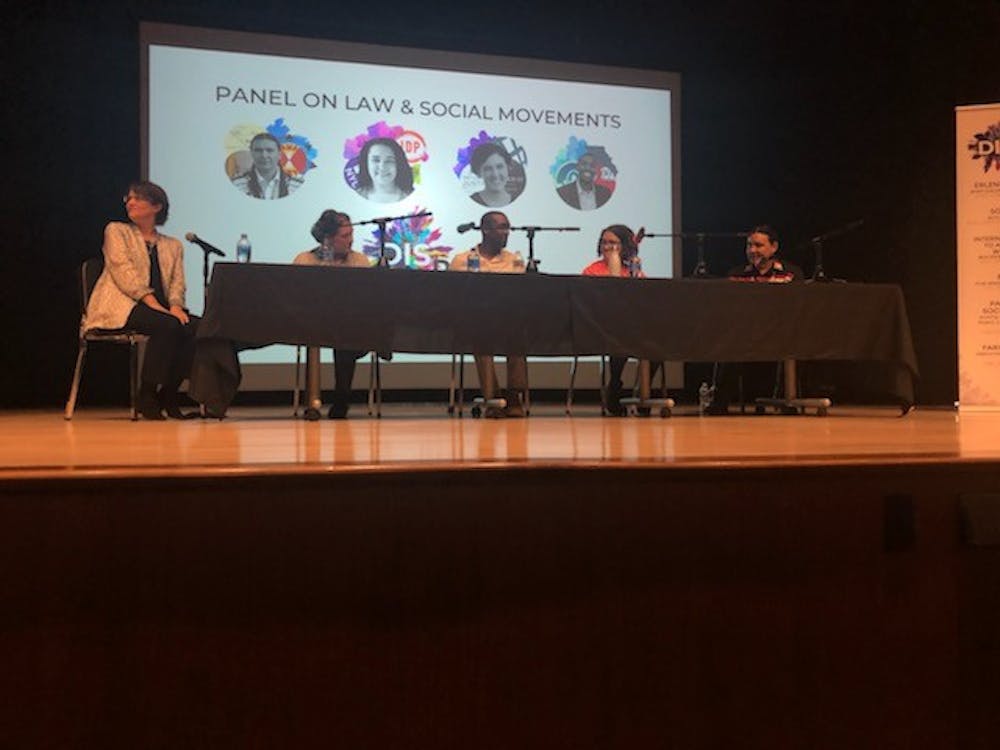The Foreign Affairs Symposium (FAS) held their penultimate event of the semester on Tuesday, featuring a panel on Law and Social Movements with speakers from a number of social justice and legal defense organizations.
The panelists included Ashley Nellis, senior research analyst at The Sentencing Project; Marie Mark, supervising attorney at the Immigrant Defense Project; Blake Strode, executive director at ArchCity Defenders; and Chase Iron Eyes, lead counsel at the Lakota People’s Law Project.
FAS Executive Director Kiana Boroumand described the relationship between the theme of this year’s symposium and the panelists.
“Our theme this year is ‘Disrupt,’ and while lawyers may not always be considered disrupters, they have the capital to do incredible and transformative work,” Boroumand wrote in an email to The News-Letter. “Our panelists are a testament to that.”
Nellis began by discussing criminal justice reform in the U.S. Her organization, The Sentencing Project, aims to reduce racial sentencing disparities and advocate for alternatives to incarceration.
She recalled an event from her work in Texas, when she visited a prison with the executive director she worked under at the American Civil Liberties Union (ACLU), where she was volunteering.
“I went with the executive director to go visit a prison where a woman came up to us and said that all of the black women in the prison were being forced to work outside in the August heat, and all the white women were working administrative jobs inside the prison,” Nellis said. “It was unbelievable, I remember to this day it was like going to a plantation.”
From that day forward, Nellis decided to focus her work on sentencing reform and on studying life sentences in America.
“That left a mark on me, that we have a criminal justice system in the United States that is very much kept under wraps and that is very much kept out of the view of the public,” she said. “I think that it’s important that all of us spend a little bit of time focusing on who we’re incarcerating and why we’re incarcerating them, and over time, I started to focus more and more on people serving life sentences.”
Blake Strode, the next speaker on the FAS panel, is the executive director of ArchCity Defenders — a public defenders’ office in St. Louis that aims to bring about systemic reform in the criminal justice system.
Strode recounted a story about a woman who was caught up in the criminal justice system after her arrest warrant was filed for not paying a fine on a ticket that was sent to the wrong address after she left her trash bin uncovered. As a result, she ended up spending three days in jail and being denied a promotion at work.
“I came to learn later this was the reality of our local criminal legal system, for more people and black people in our region every day and it had been for many years,” Strode said. “So what we do at ArchCity Defenders is we try to fight that consensus in every way that we can.”
The Immigrant Defense Project leads efforts to protect vulnerable immigrants through impact litigation, post-conviction relief and community support movements.
Marie Mark, the supervising attorney at the Immigrant Defense Project in Brooklyn, N.Y., described what she saw as the fundamental unfairness behind the immigration and deportation system in America.
“We’re dealing with a set of laws that are fundamentally unfair. Those laws are not fair. As a lawyer, I work within the constraints of those laws,” Mark said. “I’m awaiting a decision... related to a person who overstayed his visa. On the morning of one of his court days, ICE [U.S. Immigration and Customs Enforcement] picked him up. They arrested him.”
Chase Iron Eyes, lead counsel at the Lakota People’s Law Project, spoke about his work protecting the Lakota tribe’s land rights and promoting justice for Native Americans.
“I had come from a place known as the Standing Rock reservation, and so you may have heard about it during the #NODAPL struggle,” Iron Eyes said. “At Standing Rock I found out quickly that this institution doesn’t protect people... You’ll find out very quickly that law and order is designed to protect capital and property... [It is] certainly not designed to protect Mother Earth.”
After speaking on the details of his practice, Strode gave advice to the students in the audience.
“I believe very strongly in this struggle and in this world. A piece of advice for the students in the world: do what you feel the most passionate about, don’t do it to put it on a resume,” he said.
Sophomore Hana Ryan, a member of the FAS development board, told The News-Letter that she found Iron Eyes’ talk especially compelling.
“I think it was really inspiring, and it’s always good to know more. I don’t think people know the sharp dichotomy between how people on reservations live and how people 10 miles away in rural North Dakota live,” she said.
Boroumand spoke to The News-Letter after the symposium, remarking on FAS’ success at bringing together the panelists.
“It felt too short, which is a great sign. I found myself, as an audience member, wishing that I could hear so much more from the panelists,” she said. “That we were able to bring together such diverse voices who are doing such amazing work in different parts of the country, in different arenas, to bring together those voices into one place was really special.”
Correction: The original article stated that Blake Strode, of ArchCity Defenders, is an attorney there. Strode is the executive director of ArchCity Defenders. The News-Letter regrets this error.





